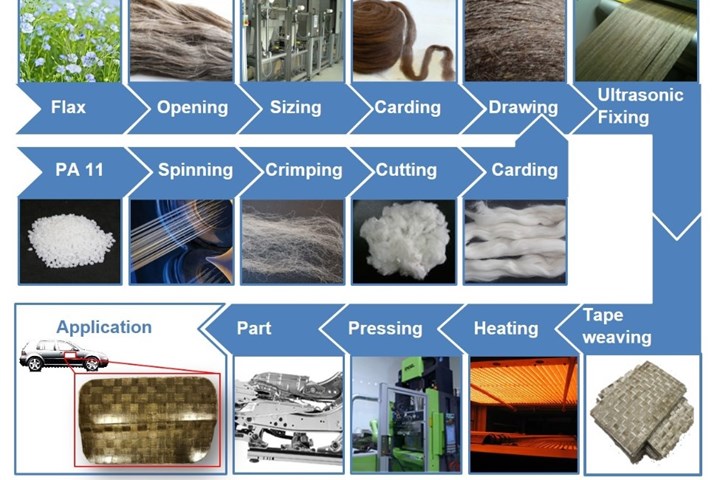Bio-based hybrid tapes assessed for lightweight applications
A project of AZL’s partner institute, ITA, integrates flax fiber reinforcement with a PA11 resin matrix. Targeted end markets include automotive and wind energy.

Source | ITA of RWTH Aachen University
AZL Aachen GmbH (Aachen, Germany) reported development and implementation of a present project by one of its partner institutes, the Institut für Textiltechnik of RWTH Aachen University (ITA, Aachen, Germany), that incorporates a process chain for the production of quasi-continuous, bio-based tapes. Operated at ITA, the project involved three institutional partners, including Sofila, Em-Systeme (Oberhausen, Germany), Safilin (Hauts-de-France) and a laboratory-scale tape production facility.
AZL says the 100% bio-based thermoplastic tapes — like conventional tapes made of glass or carbon fiber — can be processed on tape-laying machines or tape-weaving machines. The untwisted, parallel alignment of the flax fibers reportedly enables full exploitation of fiber properties, including high-quality application in automotive parts or wind turbine blades.
AZL notes that its project partner, Sofila, textured the PA11 fibers and processed them into staple fibers. In cooperation with the ITA, Safilin processed the flax and PA11 fibers into a hybrid sliver, which was then drawn and consolidated into a tape using ultrasonic welding. Specifically developed for the hybrid sliver, the ultrasonic module — developed by project partner, Em-Systeme — converts the energy of the sonotrode’s mechanical vibration into internal friction and interfacial friction, which reportedly leads to the heating and melting of the thermoplastic PA11 fibers. The drawn and parallel flax fibers were then impregnated with the melted thermoplastic. According to AZL, this procedure offers an efficient, local energy input.
Next, AZL says the produced tape was processed into UD layers, which were consolidated in a heated press. These finished composites were the cut to test and obtain the specimen’s mechanical characteristics, specifically its tensile and bending properties. According to AZL, the tapes’ tensile strength is up to 233 MPa; Young’s modulus is up to 13 GPa. Bending strength is up to 280 MPa; flexural modulus is up to 30 GPa. In comparison to the commercially available flax/PP tapes and the cited experiments at Chemnitz University of Technology, AZL reports that the natural fiber composite (NFC) produced in the sonic bio-tapes project has, on average, significantly better bending strength and bending stiffness. Furthermore, demonstrators were made from woven tapes at ITA Augsburg. The whole process chain and the demonstrator is presented in the figure above.
Acknowledgement
The ITA would like to thank the Federal Ministry of Economics and Energy— BMWi for funding the research project as part of the Zentrales Innovationsprogramm Mittelstand (ZIM). The ITA also want to thank its project partners Sofila, Safilin and EM-Systeme for the collaboration, and thank Matthias Reuter, Thomas Köhler, Alexander Janßen, Thomas Gries, the authors of the original article.
Please contact Matthias Reuter at matthias.reuter@ita.rwth-aachen.de for more information.
This post is courtesy of the CompositesWorld and AZL Aachen GmbH media partnership.
Related Content
-
Bioabsorbable and degradable glass fibers, compostable composite parts
ABM Composite offers sustainable options and up to a 60% reduction in carbon footprint for glass fiber-reinforced composites.
-
University of Maine unveils 100% bio-based 3D-printed home
BioHome3D, made of wood fibers and bioresins and entirely 3D printed, highlights Maine’s effort to address the need for more affordable housing.
-
NREL develops biomass-derived resin PECAN for wind blades
Demonstration and findings validate PECAN as a method for developing long blades that perform well with composites, outperform some resins and enable chemical recycling.















.jpg;maxWidth=300;quality=90)
